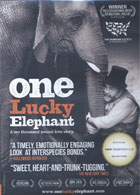
One Lucky Elephant 2011
Distributed by Ro*co Films International, llc, 80 Liberty Ship Way, Suite 5, Sausolito, CA 94965; 415-332-6471
Produced by Cristina Colissimo & Jordana Glick-Franzheim
Directed by Lisa Leeman
DVD, color, 84 min.
Jr. High - General Adult
Animal Behavior, Animal Rights
Date Entered: 11/28/2011
Reviewed by Justin Cronise, D'Youville College, Buffalo, NY and Genesee Community College, Batavia, NYOne Lucky Elephant is a touching and thought-provoking film about the bond between humans and other animals. David Darling is a circus impresario who decided to adopt a young elephant named Flora, who became the namesake and main attraction in “Circus Flora” for a number of years. When Darling decides that Flora should return to the company of other elephants, One Lucky Elephant documents the search to find her a new home, which becomes a journey that takes 9 years. Along the way the film illuminates the depth of the interspecies bond between Darling and Flora, the complexity of the love that they share, and is a testament to the capacity of animals to love in a way similar to humans.
While this film is a love story at heart and does not attempt to teach viewers, I think it has great potential in an educational setting. Through the narrative of the film, viewers will get a glimpse of behind-the-scenes at a circus, gain insight on the trade of elephants for zoos and circuses, and learn about how elephants live in captivity. The way the film exposes viewers to these different aspects covered in the film may encourage the pursuit of more information on those topics when the film is done. The film allows viewers to see that elephants have personalities and feelings; that circus life is not necessarily glamorous; that the elephant trade may be brutal and tragic; that an elephant can be diagnosed with post-traumatic stress disorder; that “tame” animals can kill; and that, somehow, people can have an sanctuary for only African elephants in the middle of Tennesee.
Another of the strengths of this film is how it comes satisfactorily to a conclusion yet raises many more questions than it answers, and engages viewers to think about a number of broader ethical and philosophical issues. Do animals feel love, and can they love other species? Is it ethical to keep animals in captivity – to keep elephants in the zoo, the circus, or as “exotic” pets? Is the current treatment of elephants too harsh? Should more be done to protect elephants from poachers in their native habitats?
One Lucky Elephant is a very well made film and a worthy winner of the Best Editing award for a feature documentary at the Woodstock Film Festival. It is expertly paced and engaging without being flashy and gives the film a feeling of sincerity. I also appreciated that there was no narrator to explain the obvious or tell viewers how to feel about any of the subjects of the film.
One Lucky Elephant is highly recommended for general audiences and is suitable for most children, and would make an excellent addition to public library collections. It is also highly recommended for junior- and senior-high school libraries in support of relevant curriculum, and could also be useful for introductory classes for college undergraduates.